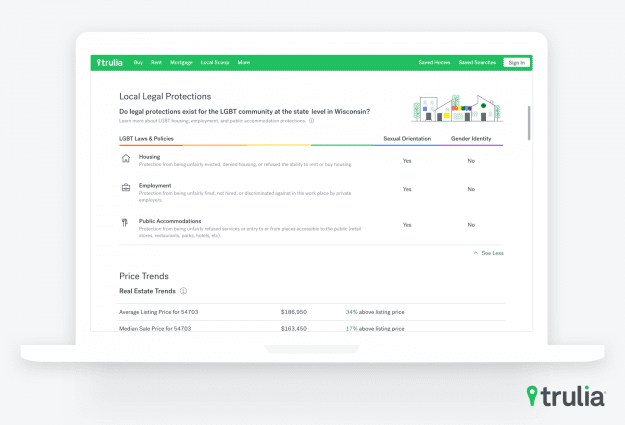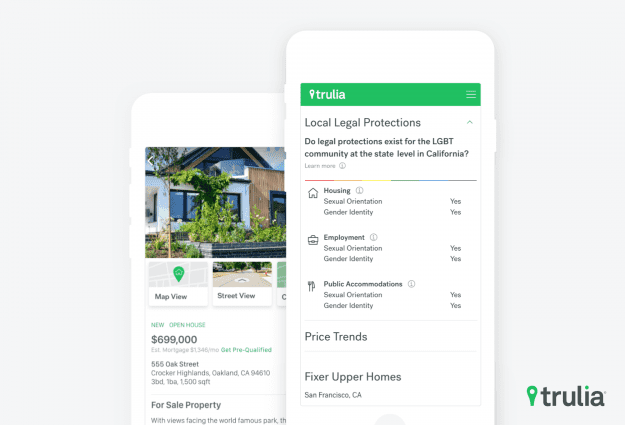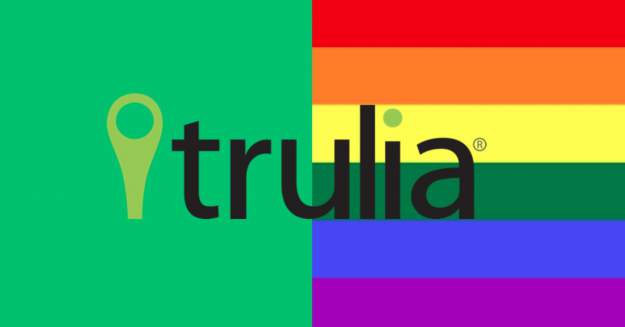I've decided to take on the task of buying a home this year. My previous abodes have been rented. I've had leases, rented month to month, but never a mortgage. It's a daunting task to take on, especially as a single person with a single income and looking for a house in a neighborhood where I could feel welcome and make those four walls a home.
I'm using many tools to find the best place for me. Having about 8 emails a day with possible purchases being dumped into my in box is exciting, but none have hit all the marks just yet. There are multiple sites out there to set up searches, bookmarks, etc.
Living within reach of Wilton Manors, Florida, one of the gayest places in America, I'm not too worried about me being accepted, but I've been in other cities in Florida where I know I would never live for me being gay would be an issue.
Local Legal Protections: A New Way to Search For And Find A Home
Trulia builds products that are designed to help you discover a place you’ll love to live. We regularly introduce new tools to help on this journey, and we’re launching an important one today: Local Legal Protections: The Local Legal Protections feature, an employee-led idea, helps homebuyers understand the non-discrimination laws that exist for the LGBT community in the jurisdiction of any prospective home.
Currently, national housing and employment non-discrimination laws only protect some classes, such as sex, race, age, color, religion, and national origin. That means explicit protections for people who identify as LGBT do not exist at the federal level and are inconsistent at the state and local levels. With the Local Legal Protections feature available on all property details pages on Trulia, homebuyers will know if their prospective new home is in a place where there are laws to prevent discrimination based on sexual orientation and gender identity in the areas of housing, employment, and public accommodations.
 When I look at a home online, I usually know the neighborhoods it is located in, know if I will feel safe and secure there. But one thing you cannot look into is the mentality of the neighborhood. You can see the run down homes, or the well kept flora, the cars up on blocks, the boarded up windows, or the clean sidewalks and front yards. I don't think to myself … am I legally allowed to live in certain buildings?
When I look at a home online, I usually know the neighborhoods it is located in, know if I will feel safe and secure there. But one thing you cannot look into is the mentality of the neighborhood. You can see the run down homes, or the well kept flora, the cars up on blocks, the boarded up windows, or the clean sidewalks and front yards. I don't think to myself … am I legally allowed to live in certain buildings?
The Trulia tool will help answer that question.
Across the United States, an estimated 55.2% of all housing units are covered by local protections for sexual orientation and/or gender identity, and 22 states, plus Washington, D.C., have full protections for housing, employment, and public accommodations.1 The feature provides details on which protections exist and if those protections are provided at the state, county, or city level.
This feature underscores Trulia’s culture of diversity, inclusion, and innovation. Not only was the Local Legal Protections feature born from a recent Innovation Week at Trulia, it was also conceived and built by the members of our internal Pride Network.
 Some questions for our readers…
Some questions for our readers…
- Would you use such a tool?
- Have you been discriminated against because you are LGBT+?
- Do you consider how safe neighborhoods are for you as an LGBT+ person?
Truila thought about some of the questions that may be raised about this new option.
Why does this only cover the LGBT community and not other groups?
The United States has no explicit federal housing and employment non-discrimination laws guaranteeing protections for individuals based on sexual orientation or gender identity. As such, LGBT protections vary significantly on a local jurisdiction by jurisdiction basis. There are, however, federal housing and employment non-discrimination laws that explicitly protect some classes, such as sex, race, age, color, religion, and national origin, among others. That said, we are actively looking into data sources for any community impacted by the patchwork nature of certain legal protections.
Why isn’t “Questioning” or “Queer” represented in this feature?
Most laws are written to prohibit discrimination based on sexual orientation and/or gender identity – regardless of the terms an individual may use to describe their sexual orientation and/or gender identity. Given that “queer” or “questioning” are not consistently defined from a policy perspective, the data provided by our partner does not include specific references to people who identify as “queer” or “questioning.”
Where is the data for this feature from?
We worked with the Movement Advancement Project, which is an independent non- profit organization that provides research on equality for people who identify as LGBT.
Why does this feature only cover housing, employment, and public accommodations?
People visit Trulia to find a home and neighborhood they’ll love and these three categories (housing, employment, and public accommodations) are most relevant to that search.
I remember just a few years ago when not looking for homes, but when visiting travel sites, there were so many that were so very front and center about their LGBT+ tools and options. Now it seems you have to dig to find that little rainbow icon, those gay travel options, those same-sex geared getaways.
In the political and social time we live in currently, where LGBT+ is not a good thing to have front-and-center if you're a business with a mixed clientel, we see Trulia stepping forward with this tool. They're putting this on their site to help our minority even when it's not "trending" to do so. We want to thank Trulia for taking that step out into the spotlight to acknowledge us, our community, and our specific needs.
1 Trulia estimated the number of housing units covered by local protections for the LGBT community based on jurisdictions identified by the Movement Advancement Project. In terms of counting housing units, we used U.S. Census 2016 5-Year American Community Survey estimates. Note that these estimates are subject to margins of error.


